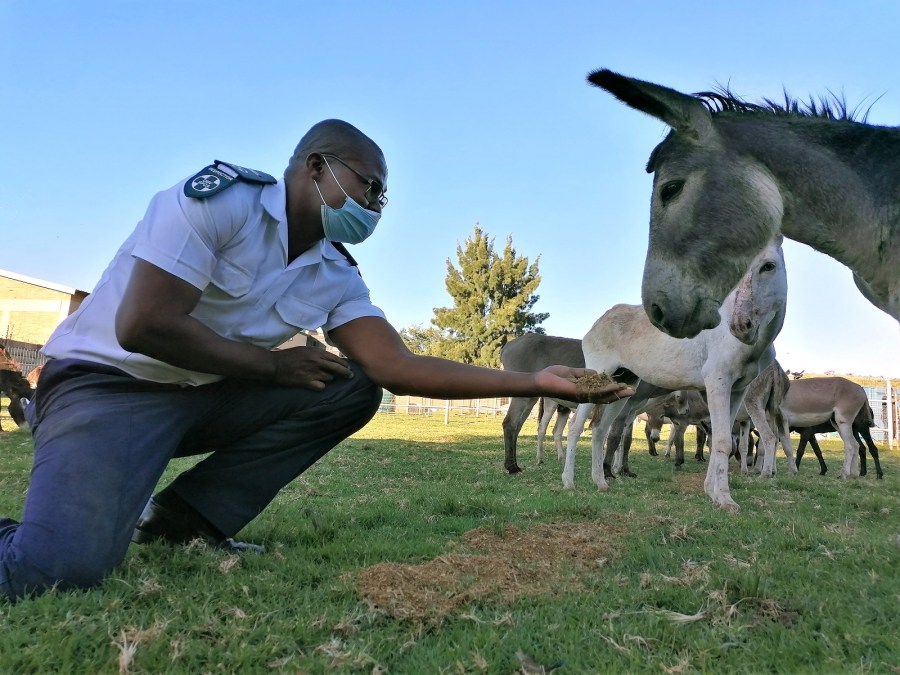More than 100 donkeys including young foals have avoided being slaughtered in South Africa after police intercepted a convoy of trucks heading towards the border with Lesotho.
It is believed the donkeys were being transported to be slaughtered so that their skins could be used for the production of a traditional Chinese medicine called ejiao.
Gelatine found in donkey hides is a key ingredient in producing ejiao. Dwindling supplies of donkeys in China means traders in Africa and elsewhere are exporting additional skins to meet an ever-increasing demand.
A statement from The Donkey Sanctuary said the rescued donkeys were suffering with severe infections as well as open wounds and some had ears missing. Many of the animals were extremely thin with ribs showing. They were also infested with ticks.
Officers from the South African Police Service (SAPS) arrested six suspects travelling with the donkeys for having no passports of their own or legal travel permits for the animals and on suspicion of animal cruelty.
All six have since been charged and found guilty of animal cruelty and for residing in South Africa illegally.
In May, Your Horse reported that a ban on slaughtering donkeys for their skin was overturned by the courts in Kenya.
The skin trade has led to widespread poaching and donkey theft in African communities, which depend on donkeys for their livelihoods.
“The incident appears to signal a shocking return of the donkey skin trade after almost 18 months of apparent inactivity,” said Marcelle Meredith, executive director of the NSPCA.
‘Skinned alive’
Marcelle added that the NSCPA began investigating the donkey skin trade more than five years ago, when large numbers of unexplained donkey skins were found across multiple farms.
The charity is sure that the skins were used to produce ejiao and that the rescued donkeys would have been killed for their hides.
“The manner in which donkey skins are obtained is gut-wrenching; starting from the way the animals are handled, transported, butchered and sometimes even skinned alive,” added Marcelle.
The Donkey Sanctuary’s statement said that around 36 mothers and young foals were despatched to the Kloof and Highway SPCA facility near Durban. The remaining donkeys travelled to the Johannesburg SPCA, where they will continue to be cared for until they can be rehomed.
The Donkey Sanctuary provided funding for the transportation costs.
“We are so grateful for the support of The Donkey Sanctuary,” said Grace de Lange, senior inspector for the NSPCA’s Farm Animal Protection Unit.
“The charity’s generosity means we can now focus our efforts and funding appeals on the long-term welfare, veterinary needs and re-homing of these donkeys, which have suffered terrible neglect and abuse at the hands of brutal animal traders.”
Call to stop the skin trade
Simon Pope, tactical response lead for The Donkey Sanctuary, added: “The NSPCA works incredibly hard to combat the illegal skin trade in South Africa, and Grace and her team are on the front line of that battle.
“This rescue of donkeys destined for slaughter is inspirational. So too is the devotion and care now being given to these hard-working animals.
“We value the long-standing partnership between The Donkey Sanctuary and the NSPCA and are glad the continued generosity of our supporters enabled us to share some of the burden of care with the NSPCA.”
The Donkey Sanctuary is calling for an urgent halt to the “largely unregulated” global donkey skin trade.
Its statement said: “The Donkey Sanctuary and the NSPCA will continue to work tirelessly not only to end the cruel and unnecessary global skin trade, but also to improve the welfare and working lives of donkeys globally.”
Grace de Lange added that authorities in South Africa must also play their part in halting the trade.
“Other countries in the region, such as Botswana, Ethiopia and Senegal, have taken action and we are calling for immediate government intervention to stop the export from South Africa of donkeys, as well as their skins or by products for any trade whatsoever,” she said.









